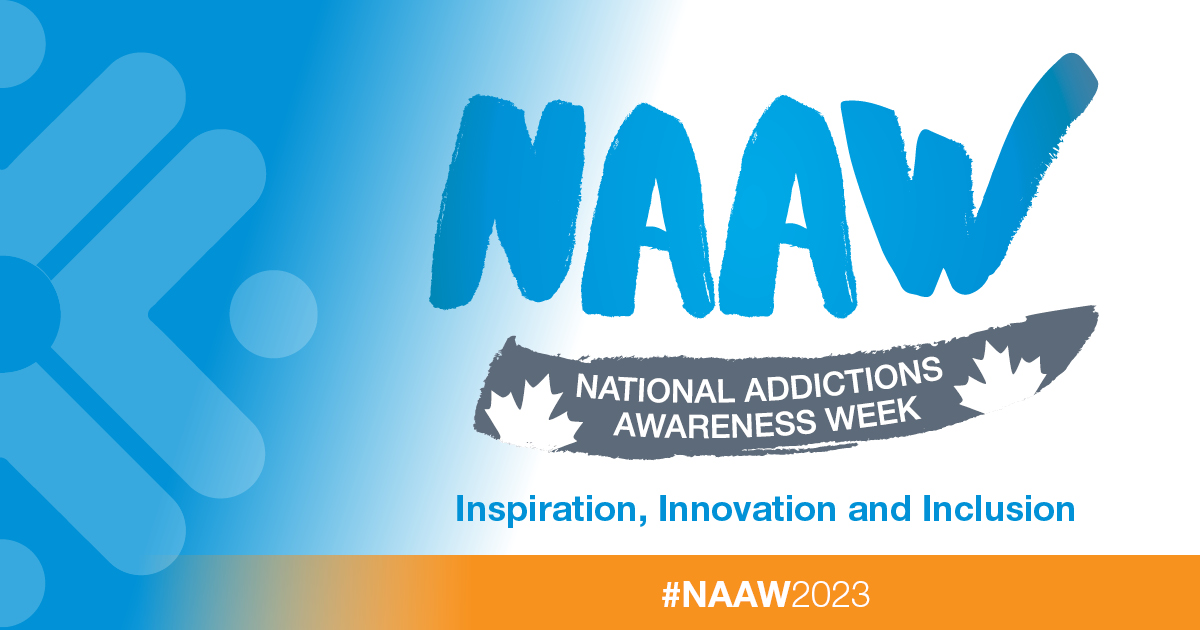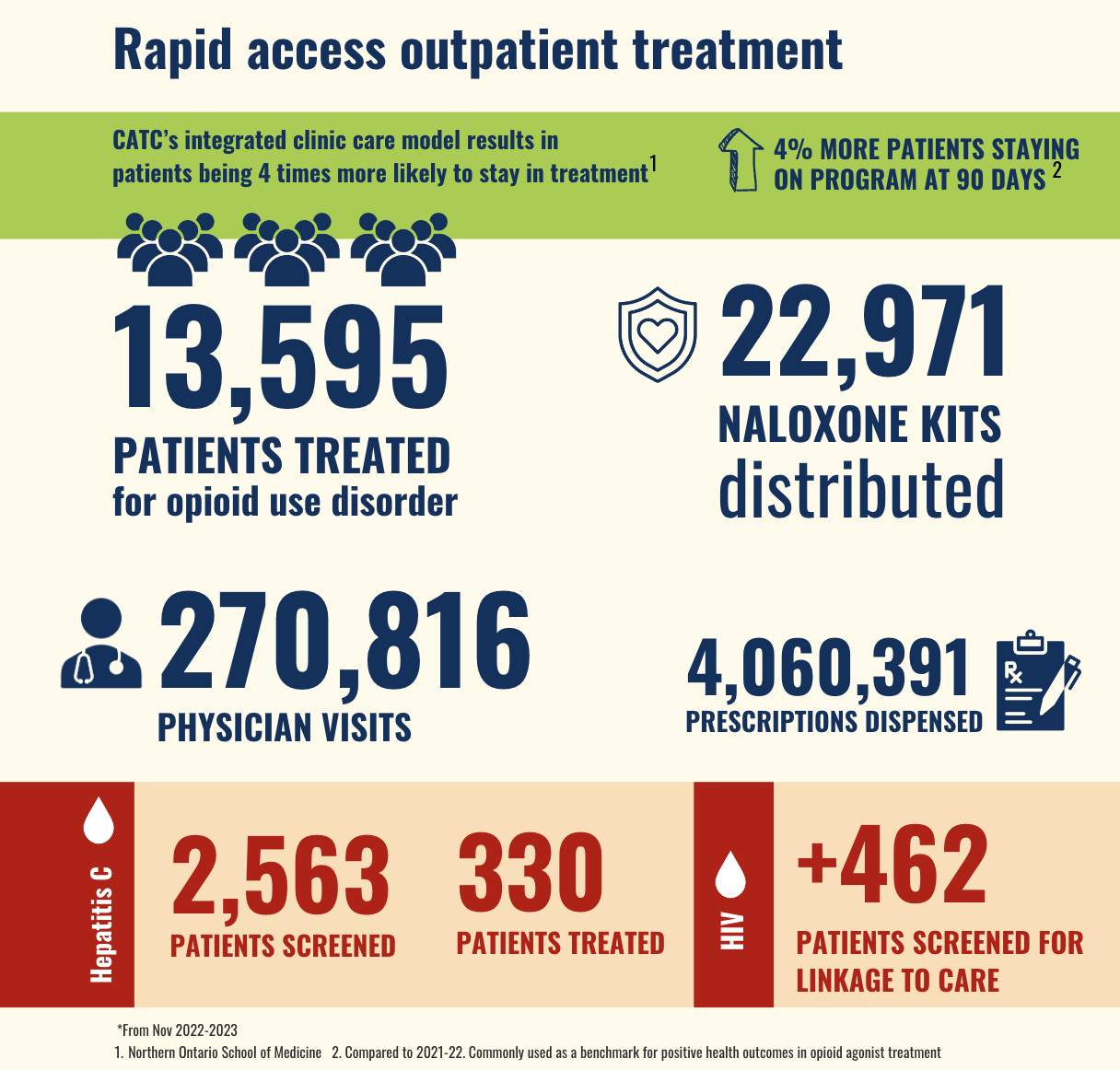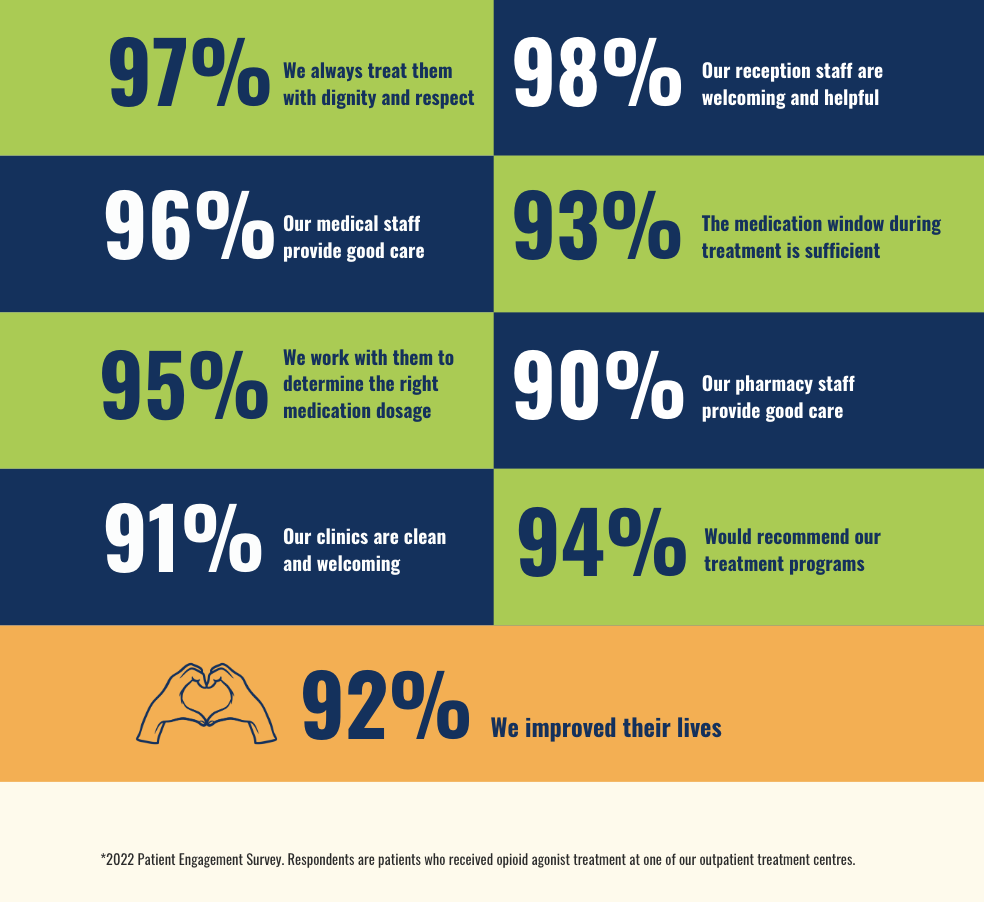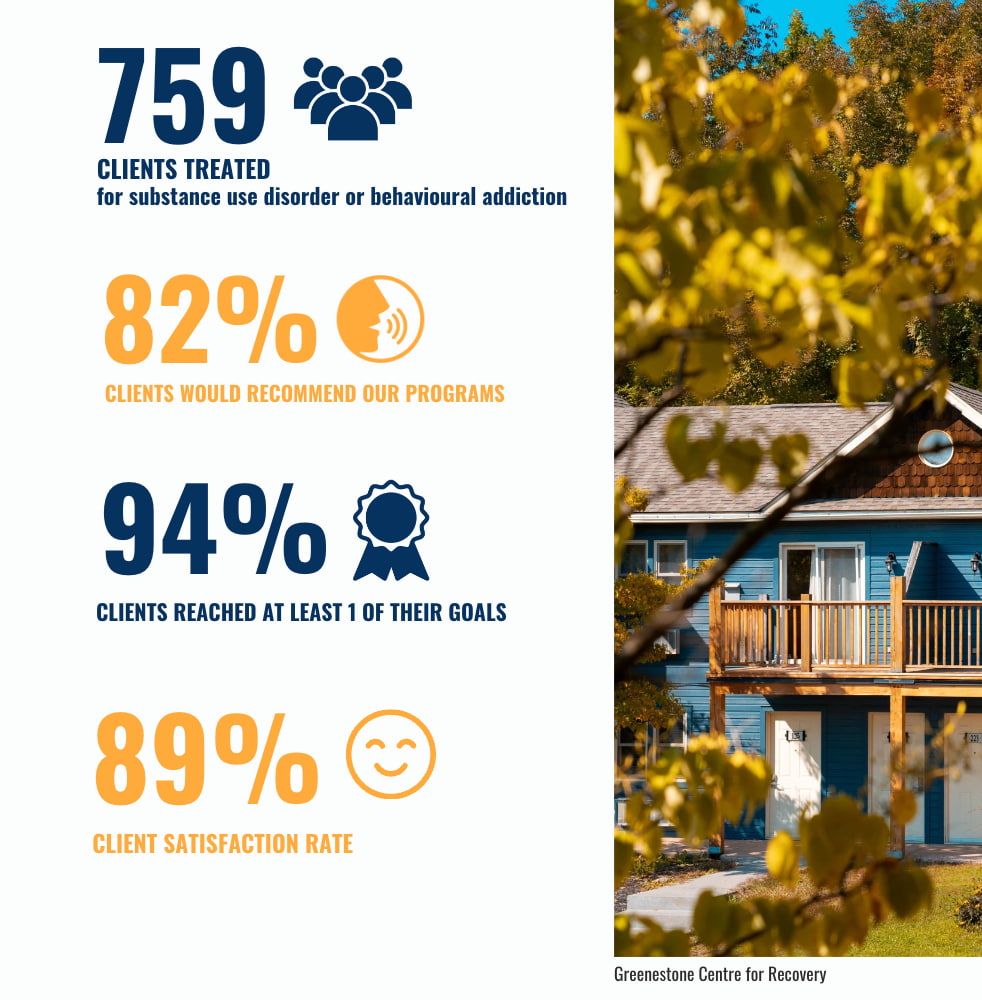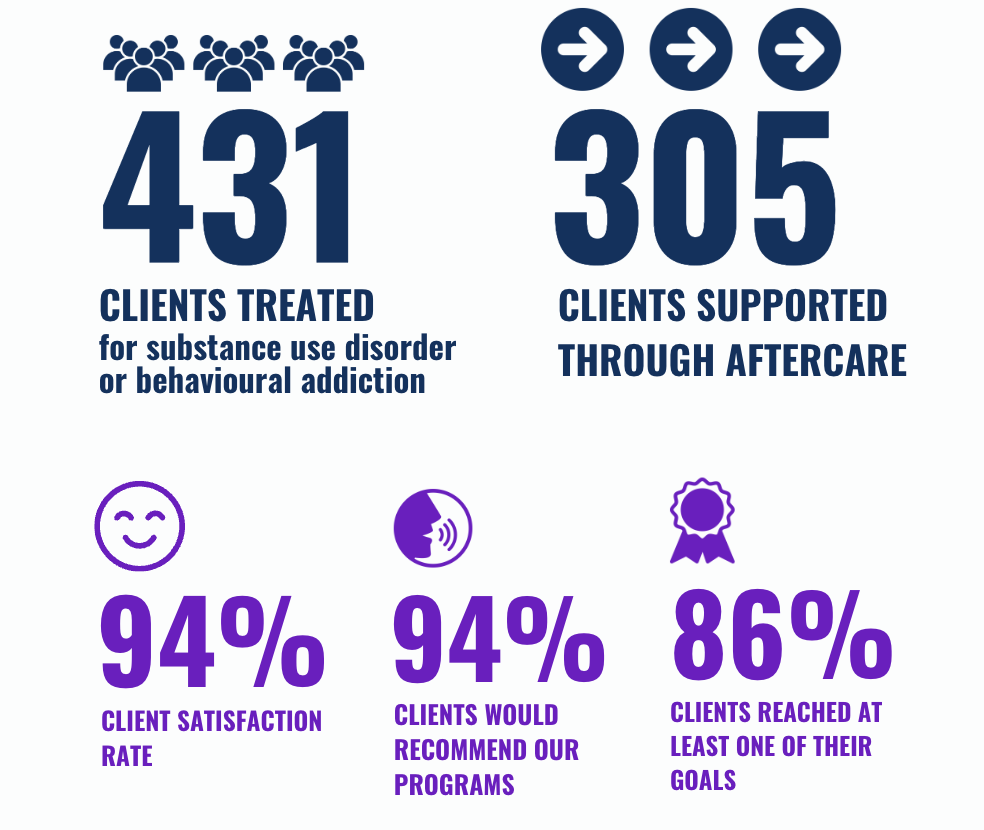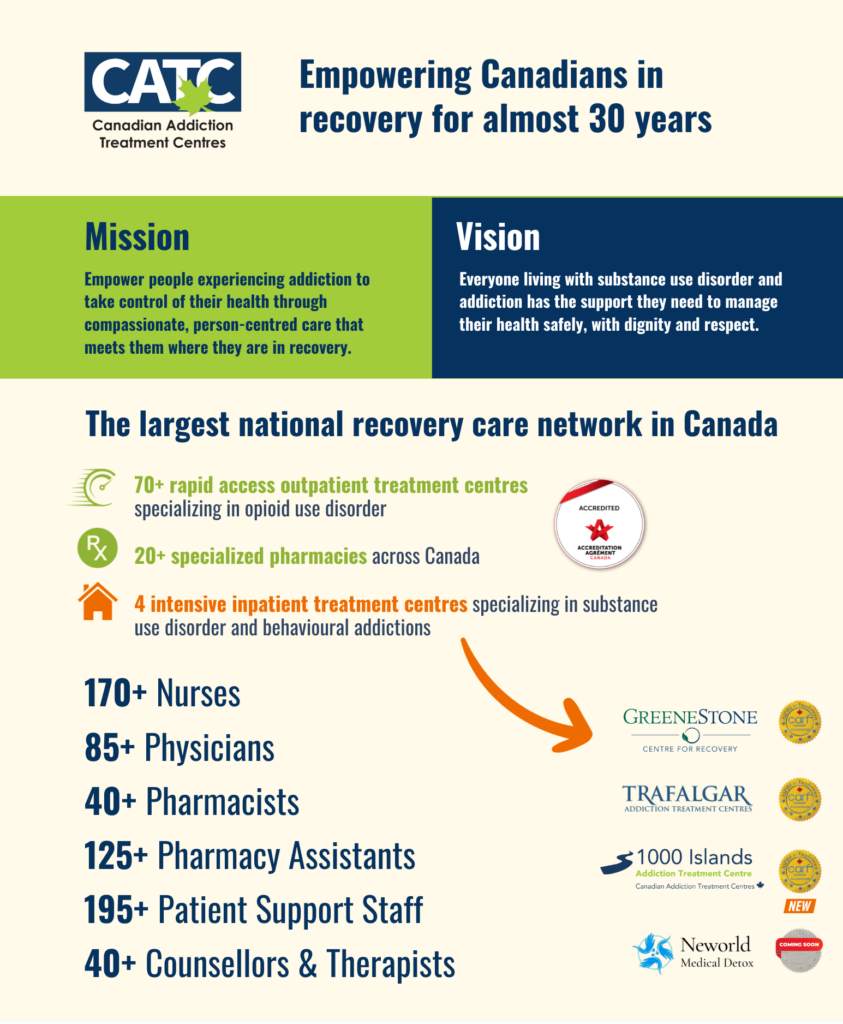Nov 19-25 is National Addictions Awareness Week: an annual event to draw attention to the ongoing impact of substance use on communities across Canada. As the largest provider of compassionate care for addictions in the country, we see firsthand every day the struggle that so many people are facing, and how stigma around drug use is making the situation immeasurably worse.
The theme this year is Inspiration, Innovation and Inclusion: three things that guide our work at Canadian Addiction Treatment Centres.
During National Addictions Awareness Week, we’re proud to share some of the incredible work being done by our dedicated cross-country care teams who are providing evidence-based treatments for substance use disorder and behavioural addictions.
Client outcomes
CATC has earned the trust of communities and healthcare partners across the country and abroad by supporting our clients in reaching their personal goals at any stage of recovery, with the dignity and respect they deserve.
While we’re proud of the figures* presented here, at the end of the day our true impact can’t truly be measured in numbers—but in lives changed. When we help someone take back control of their life, that impact extends outward to affect everyone around them.
Rapid access outpatient treatment for opioid use disorder
Intensive inpatient addiction treatment
As part of our commitment to making treatment more accessible for people from all walks of life, we’re proud to be working with a variety of collaborative partners to offer tailored programs that meet clients’ specific needs. This year, we partnered with victim services providers to launch an innovative new program at our Trafalgar Addiction Treatment Centre and Neworld Medical Detox Centre, designed to meet the needs of this extremely vulnerable population.
“The [Trafalgar] team has identified the complex and unique needs of this population. Their efforts…have provided the foundation for greater success and enhanced experiences for victim services clients that attend the program. The team has sought to meaningfully collaborate with victim services providers across the region, sharing knowledge, expertise, and best practices. I feel that the willingness to collaborate, explore and gain knowledge around human trafficking will guarantee continued success of the program.”
– Pina Marino, Program Manager, Caledon / Dufferin Victim Services
We’re also working hand-in-hand with Indigenous communities to provide culturally-appropriate, land-based treatment experiences, and with organizations supporting first-responders who are struggling with substance use triggered by PTSD.
We regularly collect client outcomes data across our 4 inpatient medical detox and treatment centres.
Here are some of the recent highlights from 2023.
Virtual addiction treatment
Our virtual program provides a more affordable and flexible treatment option for many Canadians who aren’t able to put their lives on hold to attend an inpatient program.
Whether they come to us through a publicly-funded partnership, a referral from a healthcare provider or on their own, people now have a new, easier option to begin their recovery journey from home.
This program is currently offered free of charge to British Columbians through partnerships with both the Government of BC and Vancouver Island Health Authority.
Just as important is to remember that, for people struggling with substance use, stigma can kill. When people are afraid to ask for help because they’re worried they’ll lose their family or their job (or both), the isolation that comes from that can be the difference between life and death.
There are small things all of us can do to help break down misconceptions and misinformation about addiction. Check out our stigma-breaking toolkit below to learn how to be an ally to people who use drugs, along with some ways you can help spread awareness about this “silent epidemic”.
If you or someone you know needs help, just know that you’re not alone. Our network of over 80 treatment centres across Canada provide a judgement-free, compassionate and understanding environment to support you or them at any stage of recovery. Not sure where to start? Our friendly client information line can help. Give us a call at 1 877 937 2282, or send us a message.
From all of us here at Canadian Addiction Treatment Centres, we celebrate each any every one of the more than 15,000 people currently in our care, and we stand with you this week and every day.
A Special Message from Our CEO
The overdose crisis can’t be measured in numbers
Lives lost to unregulated drug use have more than doubled since the opioid crisis was declared a public health emergency in 2016 by the Government of Canada. Since then, over 38,500 people have died from opioid-related causes across the country – an average of 21 a day. So far this year, fentanyl has caused an estimated 81% of fatal overdoses—up 42% since 2016.
In British Columbia, opioids are now the leading cause of death in the provinces’ youth. In Ontario, 85% of all substance-related deaths from 2018-2021 were opioid-related. Northern Ontario residents are 3 times more likely to die from opioid use than those living in Southern parts of the province, and 6 times more likely for Indigenous Peoples. Canada’s performance on the global stage isn’t any better. A recent study shows Canada in the bottom three worst-performing OECD countries overall in opioid-related mortality (after Estonia and the US).
When confronted daily with numbers as terrifying as these, it’s easy to lose sight of the fact that these aren’t just numbers: they’re people. Every death is a tragic loss that ripples out to encircle the family, friends, care providers and community members around them. Using existing data on the number of people affected by a person’s death, fatal opioid overdoses in Canada have directly affected at least 346,500 people since 2016 – nearly 1% of our total population.
Pervasive stigma around drug use would have us believe that we and those we love are immune to the tragedy of opioid use disorder – that it only affects people who make “bad choices”. But nothing could be farther from the truth. Opioid use disorder doesn’t care how much money you make, where you live or what you plan to do with your life. 5 in 6 people who die from overdose in Ontario are not homeless. Our clients are hard-working parents, successful professionals, and active community members. They are people like you or I who suffered one serious injury, underwent one surgery or lived through one traumatic life event; any of which can easily lead us down the steep and slippery slope to opioid dependence.
This crisis can’t, and won’t, be solved by charts and graphs or behind closed doors – every stakeholder across the full spectrum of healthcare must come together, jointly building the path forward in saving lives in our communities. For us that means working together with service providers, unions, associations, and policy makers to create innovative, evidence-based pathways to care that meet people where they are in recovery. It means collaborating with leading researchers to leverage CATC’s database of patient outcomes – the largest database for opioid use disorder treatment in Canada – to inform care at scale. We must keep our patients at the centre of all that we do, engaging them in our continuous improvement, and holding ourselves accountable to them as a trusted community care provider.
Thank you for helping us to help thousands of people in recovery every day.
April Gamache, CEO, Canadian Addiction Treatment Centres
Stigma-breaker toolkit
Last year during NAAW 2022 we shared a series of social media graphics featuring addiction facts to help reduce the stigma surrounding substance use and addiction.
You can support National Addictions Awareness Week this year by sharing them on social media with the hashtags #NAAW2023 and #InspirationInnovationInclusion.
Feel free to accompany them with these pre-written social media posts, or share your own story!
1. During #NAAW2023, help break the stigma around substance use by removing harmful words from your vocabulary. Say “person with/experiencing addiction”, and put the person first. #StigmaEndsWithMe
When you show compassion to someone speaking about their #addiction, they’re more likely to seek the care they need to get back on track. #InspirationInnovationInclusion
2. Far too many Canadians with #substanceusedisorder are suffering in silence because of fear of judgment and prejudice.
This #NAAW2023, learn the facts about #addiction to help end the stigma surrounding people who use substances. #StigmaEndsWithMe #InspirationInnovationInclusion
About Canadian Addiction Treatment Centres
Canadian Addiction Treatment Centres (CATC) is Canada’s largest provider of recovery programs and supports for substance use disorder and addictions. With over 80 outpatient and inpatient facilities across Canada, we offer comprehensive evidence-based care that meets people where they are in recovery, with compassion and respect.
Founded in 1995 in response to an immediate need for expanded access to accessible opioid use disorder treatment in Ontario, CATC has quickly become Canada’s leading community care partner supporting people experiencing substance use disorder and behavioural addictions, as well as concurrent underlying mental health conditions.
Today, we help thousands of people every day live their best quality of life, at any stage of recovery.
